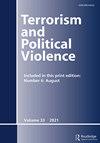Gathering Storm: An Introduction to the Special Issue on Climate Change and Terrorism
IF 2.1
2区 社会学
Q1 INTERNATIONAL RELATIONS
引用次数: 5
Abstract
Climate change is a potential major driver of future terrorism. It is already recognised by many (if not most) nations as a strategic security threat, though the potential role it can play in igniting, facilitating, or exacerbating terrorist conflict has been relatively unexplored. There are, however, growing signs that climate change—either through direct or indirect impacts—should be considered as a significant macro-level driver of terrorism. It is certainly well established that the causes of terrorism can involve both large-scale geo-political processes and at the same time much more low-key individual level personal factors. Much of the traditional debate around the “root causes” of terrorism has concen-trated heavily on macro-level drivers with a particular focus on factors tied to economic, political and historical forces. 1 The relative importance of each factor can vary enormously depending on the perspective taken not only in research terms but also in terms of potential policy interventions. It is critical to acknowledge, however, that not all causes will be present in every case, and those that are present do not always have the same degree of impact. A cause of vital importance in one terrorist conflict might play no detectable role in others. Given understand the and Attempts to do so have to be sophisticated in how “causes” are framed. can work at different levels and important to the trouble to distinguish between these. Similarly, we how then on the data used and the reached. is on many key issues and care is needed in selecting relevant and be to not we the search to comprehend the causes of terrorism. The critical in 8. Two hundred and seventy-six incidents were recorded in the GTD connected to environmentally motivated terrorism. Fifteen additional incidents connected to Theodore Kaczynski bring the total to 291. The GTD incidents were identified through the search term “environmentalist” as well as the following list of specific perpetrator group names:风暴聚集:气候变化与恐怖主义特刊简介
气候变化是未来恐怖主义的潜在主要驱动因素。它已经被许多(如果不是大多数)国家视为一种战略安全威胁,尽管它在点燃、促进或加剧恐怖主义冲突方面可能发挥的潜在作用还相对未被探索。然而,越来越多的迹象表明,气候变化——无论是通过直接的还是间接的影响——应该被视为恐怖主义的重要宏观驱动因素。毫无疑问,恐怖主义的起因既可能涉及大规模的地缘政治进程,同时也可能涉及更为低调的个人层面的个人因素。围绕恐怖主义“根源”的传统辩论大多集中在宏观层面的驱动因素上,特别关注与经济、政治和历史力量相关的因素。每个因素的相对重要性可以有很大的不同,这不仅取决于研究方面的观点,也取决于潜在政策干预方面的观点。然而,重要的是要认识到,并非所有的原因都会出现在每一个案例中,而那些存在的原因并不总是具有相同程度的影响。在一场恐怖主义冲突中至关重要的原因可能在其他冲突中没有明显作用。要理解这一点,就必须对“原因”的框架进行复杂的理解。可以在不同的工作层次和重要的麻烦来区分这些。同样,我们如何对数据的使用和达到。在许多关键问题上都需要谨慎选择相关的和不相关的我们来了解恐怖主义的原因。临界在8。GTD记录了276起与环境恐怖主义有关的事件。另外15起与西奥多·卡钦斯基有关的事件总数达到291起。GTD事件是通过搜索“环保主义者”以及以下具体肇事者团体名称列表确定的:
本文章由计算机程序翻译,如有差异,请以英文原文为准。
求助全文
约1分钟内获得全文
求助全文
来源期刊

Terrorism and Political Violence
Multiple-
CiteScore
5.60
自引率
8.30%
发文量
87
期刊介绍:
Terrorism and Political Violence advances scholarship on a broad range of issues associated with terrorism and political violence, including subjects such as: the political meaning of terrorist activity, violence by rebels and by states, the links between political violence and organized crime, protest, rebellion, revolution, the influence of social networks, and the impact on human rights. The journal draws upon many disciplines and theoretical perspectives as well as comparative approaches to provide some of the most groundbreaking work in a field that has hitherto lacked rigour. Terrorism and Political Violence features symposia and edited volumes to cover an important topic in depth. Subjects have included: terrorism and public policy; religion and violence; political parties and terrorism; technology and terrorism; and right-wing terrorism. The journal is essential reading for all academics, decision-makers, and security specialists concerned with understanding political violence.
 求助内容:
求助内容: 应助结果提醒方式:
应助结果提醒方式:


